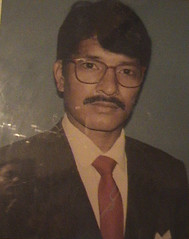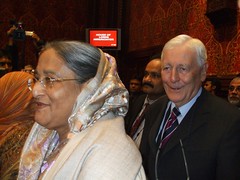Sheikh Hasina, ex Prime Minister of Bangladesh and leader of the Awami League and Lord Eric Avebury arrive at the Moses Room in the House of Lords for a Conference on Democracy, Human Rights and the prospect of Free and Fair Elections in Bangladesh, Thursday 9th October 2008. The event was organised by the International Bangladesh Foundation.
Lord Avebury chaired the packed, high security conference and gave an introduction to Sheikh Hasina and her recent incarceration as well as her achievements whilst in power in Bangladesh.
"We want democracy and power transferred back to the people by the ballot and not the bullet," Sheikha Hasina demands.
"E
mergency Rule cannot continue for months and years. There is provision for Emergency to last for 120 days. Why is there still a State of Emergency? The Emergency should be withdrawn."Statements of support for Sheika Hasina were made by members of the British Awami League and the Women's UK Awami League, as well as members of the All Party Parliamentary Group on Bangladesh, including
Baroness Pola Uddin,
Lord Dholakia and also
Harry Cohen MP for Leyton and Wanstead, Jeremy Corbyn MP for Islington North and Brad Adams of Human Rights Watch.
Brad Adams echoed the call of Sheikh Hasina and others speaking for the need to remove the State of Emergency in order for free and fair elections to take place. He also drew parallels with Pakistan where a pre-requisite of the election was the removal of Emergency Rule. He also stressed the importance of ending impunity that exists, whichever party is successful in the elections planned for 18th December 2008.
"There are concerns that leading members of the Banlgadesh Army and military forces are putting people in key positions of power in a bid to hold on to power after the elections."
The support by the current Labour Government of the military backed Caretaker Government of Bangladesh and the lack of condemnation of the excesses of the Bangladesh Army, Rapid Action Battalion (RAB) in suppressing political opponents was also called into question.
I was able to ask Sheikh Hasina a question about the situation in the Chittagong Hill Tracts.
Firstly let me congratulate Sheikh Hasina and her Awami League Party for being the first Government of Bangladesh to earnestly attempt to solve the inequality and conflict suffered by the Indigenous Peoples of the Chittagong Hill Tracts, with the historic signing of the Peace Accords in 1997.
Does Sheikh Hasina believe that free and fair elections are possible in the Chittagong Hill Tracts given the historic policies that have so drastically changed the population balance in the region? (Such as the forced resettlement policy that has brought Bengali settlers from the plains that have altered the demographic balance in the region).
Sheikh Hasina reiterated her own as well as the Awami League's commitment to implementing the Peace Accord. She also reaffirmed the importance of the Land Commission in resolving the problems in the CHT. Sheikh Hasina affirmed that her Government would do more if returned to power and said that the reason more had not been done was because they were in power for only five years.
I was heartened by Sheikh Hasina' promise to restart the stalled Peace Accord if returned to power. I wish her and the people of Bangladesh the opportunity to enjoy free and fair elections. And hope that the problem of the voter lists do not rob the already vulnerable Jumma Indigenous Peoples of the CHT of their opportunity to participate in free and fair elections. Sadly, this may not be possible in the Hill Tracts with the inclusion of non resident Bengalis on the voter lists. However, we can still hope that the elections are not marred by violence.



